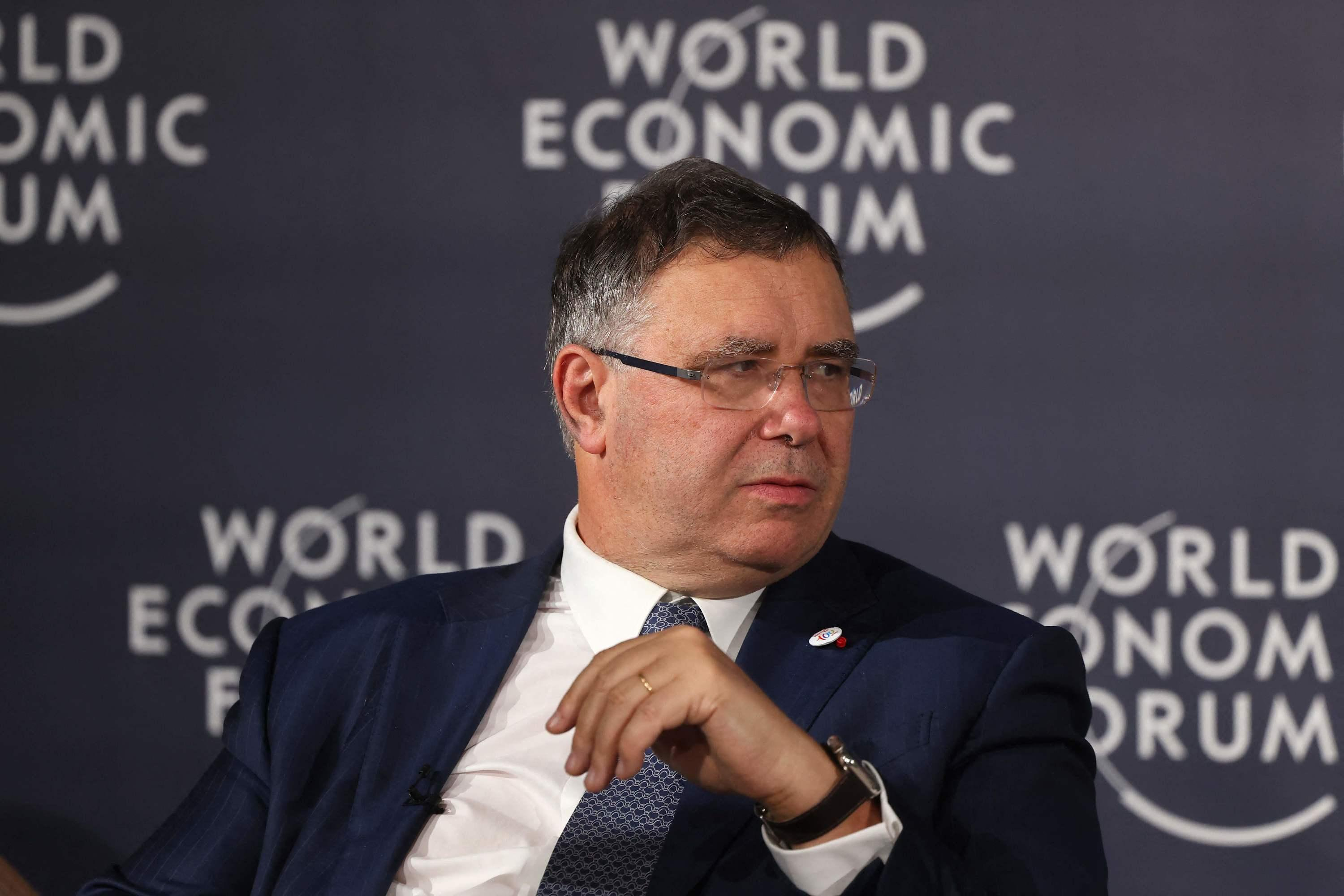At the conference Innovation and sustainability at the center of economic growth, which EXPANSIÓN held this Monday at the Iberdrola Tower in Bilbao, the Basque Minister of Economy and Finance, Pedro Azpiazu, criticized the aggressive monetary policy, articulated with "important and constant "interest rate increases that the Federal Reserve and the European Central Bank have deployed to return the inflation rate to the stability objective of 2%.
This strategy has led to shocks in the financial system that seem forgotten, such as the bankruptcies of American regional banks and Crédit Suisse.
The Basque economic official has warned of the effects that the rate hike is having on economic growth, having left many business investment and family consumption plans unviable. In his opinion, in Europe price control has been largely determined by changes in energy policy (supply guarantees, subsidies, electricity market reforms and tax changes, among others), in addition to monetary policy.
"Outdated recipes are being applied that, far from solving the problems, aggravate them," said Azpiazu, recalling the risks of stagflation in Europe. In his opinion, and taking into account the latest statements by the president of the ECB, Christine Lagarde, there is still a long period of slowdown in credit, consumption and investment, and therefore, suffering for agents in order to "tame inflation to an arbitrarily low level. "Why is the objective 2%, and not 3% or 5%?" Azpiazu asked.
The Basque Minister of Economy has been against contractionary monetary and fiscal policies at a time when Europe is almost on the verge of recession. In his opinion, it is a mistake to return to applying fiscal rules in 2024, as planned in the EU; and above all, demand them in a homogeneous way from all countries and regions, regardless of their behavior. For this reason, the Basque Government demands a moratorium on the return to fiscal budget discipline.
During the round tables, businessmen agreed that Euskadi has the muscle to undertake digital reindustrialization, and that it must take advantage of its technological advantage to attract more industry.
Topics such as reindustrialization, digitalization or innovation are not foreign to the Basque economic fabric. In fact, according to Justino Martínez Salinas, CEO of Zucchetti Spain, "30 years ago the Basque industry began to worry about being computerized, or what we would say today, digitalized." For this reason, the participants summoned by EXPANSIÓN to discuss Reindustrialization in a green and digital key have agreed in ensuring that Euskadi is in a good position to address challenges common to all social and economic agents.
Along with the director of the technology firm, the director of innovation of Iberdrola, Roberto Mariscal, the president of Innobasque Manuel Salaverria, and the president of Cebek, Carolina Pérez de Toledo, contributed their opinions in a discussion moderated by Iñaki Garay, deputy director of EXPANSION.
All of them have commented on examples of initiatives and programs developed in Euskadi that confirm their anticipation of this reindustrialization scenario, although they have also agreed that we must continue pushing in this direction. "We have to be able to continue delving deeper into this ecosystem," insisted Mariscal, from Iberdrola. For the energy innovation director, "we must take advantage of our capabilities, provide ourselves with more competitiveness and internationalization and be able to attract more industry." In this sense, Roberto Mariscal insists that the driving effect of renewable energies cannot be ignored. "It is key that the industry can have stable prices and cost control. The opportunity to attract these industries to Euskadi and Spain is fantastic."
The participants of the roundtable on innovation and digitalization in services have indicated that the digital transition cuts across all sectors of activity, but also its users and clients.
In many areas, it is society that sets the lines along which services should innovate, from cultural institutions to educational centers. To respond to these changes, the training of new professionals, whose profiles are constantly evolving, is essential.
"Today we do not know what capabilities companies are going to need," according to Itziar Epalza, general director of the Euskadi Technology Park. The director of the Guggenheim Museum Bilbao, Juan Ignacio Vidarte, the rector of the University of Deusto, Juan José Etxeberria and the general director of the Basque Culinary Center, Joxe Maria Aizega, participated in the debate.
Although from different points of view, they are all very close to the users, whether they are companies, visitors or students, which is why they have agreed that technological advances must also respond to the needs of society.
Regarding the university, the rector of Deusto recalls the efforts to promote scientific vocations "because there is a great need and commitment to generating knowledge and transferring it to the company." Although, Juan José Etxebarria recognizes that "a wide range of different professions committed to the environment are also needed."
The general director of Amazon responsible for the logistics centers in Spain, Iñadi Ugaldo, participated in the event; and the provincial deputy of Bizkaia for Economic Promotion, Ainara Basurko.
The new CEO of Kutxabank, Eduardo Ruiz de Gordejuela, has been convinced that the arrival of NextGen funds to Euskadi will become "a lever of opportunity" in a context that, like the current one, is full of unknowns and that is experiencing a paradigm shift, worldwide. In his opinion, we went from a world that was "much more predictable and orderly" to a much "less predictable, more insecure and less easy to navigate" scenario that has been marked by the pandemic, problems in the supply chain and the Ukrainian war.
Ruiz de Gordejuela has indicated that we are experiencing a "deglobalization or relocation", in which many Western companies are reconsidering relocating their factories to their home markets. This new strategy is being seen in direct investment decisions, and some countries are already competing successfully to host these relocations.
Euskadi, due to its own industrial tradition and its innovation and productivity, can take advantage of this trend of deglobalization, and "has a lot to say and contribute in this new competition for decision-making and production centers."

 B:SM will break its investment record this year with 62 million euros
B:SM will break its investment record this year with 62 million euros War in Ukraine: when kyiv attacks Russia with inflatable balloons loaded with explosives
War in Ukraine: when kyiv attacks Russia with inflatable balloons loaded with explosives United States: divided on the question of presidential immunity, the Supreme Court offers respite to Trump
United States: divided on the question of presidential immunity, the Supreme Court offers respite to Trump Maurizio Molinari: “the Scurati affair, a European injury”
Maurizio Molinari: “the Scurati affair, a European injury” Irritable bowel syndrome: the effectiveness of low-carbohydrate diets is confirmed
Irritable bowel syndrome: the effectiveness of low-carbohydrate diets is confirmed Beware of the three main sources of poisoning in children
Beware of the three main sources of poisoning in children First three cases of “native” cholera confirmed in Mayotte
First three cases of “native” cholera confirmed in Mayotte Meningitis: compulsory vaccination for babies will be extended in 2025
Meningitis: compulsory vaccination for babies will be extended in 2025 Thanks to intelligent cameras, RATP will indicate the least crowded trains on line 14
Thanks to intelligent cameras, RATP will indicate the least crowded trains on line 14 Dubai begins the transformation of Al-Maktoum to make it the future “largest airport in the world”
Dubai begins the transformation of Al-Maktoum to make it the future “largest airport in the world” When traveling abroad, money is a source of stress for seven out of ten French people
When traveling abroad, money is a source of stress for seven out of ten French people Elon Musk arrives in China to negotiate data transfer and deployment of Tesla autopilot
Elon Musk arrives in China to negotiate data transfer and deployment of Tesla autopilot Two people arrested for attempted damage to classified property at the Musée d’Orsay
Two people arrested for attempted damage to classified property at the Musée d’Orsay Death of composer Jean Musy, at 76, author of the music of Papy fait de la resistance, Les Champs-Élysées
Death of composer Jean Musy, at 76, author of the music of Papy fait de la resistance, Les Champs-Élysées Fanny Ardant prodigious in The Wound and the Thirst
Fanny Ardant prodigious in The Wound and the Thirst Hospitalized for pneumonia, Véronique Sanson cancels her concert in Nantes
Hospitalized for pneumonia, Véronique Sanson cancels her concert in Nantes Skoda Kodiaq 2024: a 'beast' plug-in hybrid SUV
Skoda Kodiaq 2024: a 'beast' plug-in hybrid SUV Tesla launches a new Model Y with 600 km of autonomy at a "more accessible price"
Tesla launches a new Model Y with 600 km of autonomy at a "more accessible price" The 10 best-selling cars in March 2024 in Spain: sales fall due to Easter
The 10 best-selling cars in March 2024 in Spain: sales fall due to Easter A private jet company buys more than 100 flying cars
A private jet company buys more than 100 flying cars This is how housing prices have changed in Spain in the last decade
This is how housing prices have changed in Spain in the last decade The home mortgage firm drops 10% in January and interest soars to 3.46%
The home mortgage firm drops 10% in January and interest soars to 3.46% The jewel of the Rocío de Nagüeles urbanization: a dream villa in Marbella
The jewel of the Rocío de Nagüeles urbanization: a dream villa in Marbella Rental prices grow by 7.3% in February: where does it go up and where does it go down?
Rental prices grow by 7.3% in February: where does it go up and where does it go down? Europeans: a senior official on the National Rally list
Europeans: a senior official on the National Rally list Blockade of Sciences Po: the right denounces a “drift”, the government charges the rebels
Blockade of Sciences Po: the right denounces a “drift”, the government charges the rebels Even on a mission for NATO, the Charles-de-Gaulle remains under French control, Lecornu responds to Mélenchon
Even on a mission for NATO, the Charles-de-Gaulle remains under French control, Lecornu responds to Mélenchon “Deadly Europe”, “economic decline”, immigration… What to remember from Emmanuel Macron’s speech at the Sorbonne
“Deadly Europe”, “economic decline”, immigration… What to remember from Emmanuel Macron’s speech at the Sorbonne These French cities that will boycott the World Cup in Qatar
These French cities that will boycott the World Cup in Qatar Mercato: Fonseca coach of AC Milan? The Lille coach speaks
Mercato: Fonseca coach of AC Milan? The Lille coach speaks Ligue 1: OM with a three-way defense, Lens changes almost nothing
Ligue 1: OM with a three-way defense, Lens changes almost nothing Ligue 1: PSG officially crowned champion of France for the 12th time
Ligue 1: PSG officially crowned champion of France for the 12th time Ligue 1: Lyon offers Monaco and gets closer to a European place
Ligue 1: Lyon offers Monaco and gets closer to a European place

















